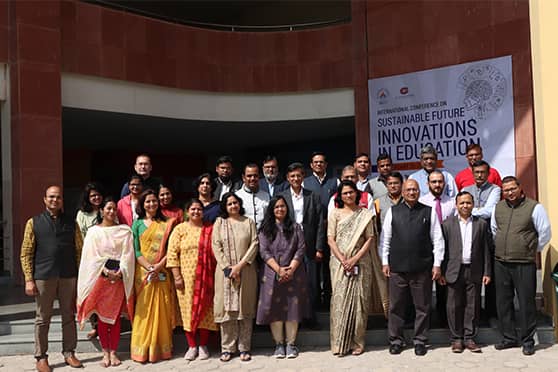ICSFIE 2022 ends with panelists lauding online learning for innovation


The two-day international conference, ICSFIE 2022, on 'Sustainable Future: Innovations in Education', organised by JK Lakshmipat University (JKLU), Jaipur, ended with more than 1,000 viewers and 22 speakers from across the globe.
For the mega event, the university had collaborated with St Cloud State University, USA, and AIC-JKLU, and the conference received 70-plus research submissions, of which 48 promising works were presented.
From eminent speakers from the US sharing their views on “Future Trends in Engineering Education” and discussions on how human-centred education and automation is changing the future of education to multiple sessions which focused on the role of ed-tech in education, new and emerging ed-tech start-ups, models for financing education etc, the conference was packed with relevant information and engaging interactions.
In continuation to a pre-conference webinar on “Innovation in School Education,” the conference had a special session where seven selected case studies from school educators were presented again. The panellists from India and abroad pitched ideas and debated on how education has and will change in the coming future.
The concluding day’s guest of honour, Pramath Raj Sinha, founding dean, ISB Hyderabad, said online and blended education is the way forward and over time, ‘online learning’ will be replaced with only ‘learning’. “In today’s time, online learning is fundamental. When the printed book was introduced, nobody imagined books as a way to educate. But, slowly and steadily printed books started to become mainstream in education. Even when it comes to online education, we hear the same kind of scepticism. Moreover, the education in university may be limited in how much it can teach and what all it can teach. But with online learning, many innovations can be achieved,” Sinha added.
Prof Ajit Chaturvedi, director, IIT Roorkee, who was the chief guest, said online learning bridged the gap in the education system and brought diversity in education. “The kind of respect that online learning has acquired in the last few years was completely unthinkable. Before 2020, we always thought that yes, this mode is available, and maybe once in a while 10% or 15% can use it; but the kind of influence it has had in the last few years is really commendable. At the same time, even in this misery we are able to reach out to people who would never have physically been able to come to the campus. So this is a new door that has opened. But I believe that there are some more doors that have opened up and I believe that, in the last one year, it has shown that it could solve one of the biggest problems of developing countries,” he added.
On sharing his takeaway from the two-day conference, Dheeraj Sanghi, chairman of conference steering Committee and vice-chancellor, JKLU, said, “So many people talked about how online is changing everything, how digital technologies are going to change, even more in the future and all that. What we need today is ethics, attitude, and problem solving skills. Few people talked about liberal arts, which is a strong component of education. Going forward, this will help you in learning, critical thinking, problem solving, and so on and so forth.”
A Balasubramaniam, director- Institute of Design, JKLU, presented the vote of thanks to all the panelists, guests, participants and organisers for making the conference a big success. The conference was co-sponsored by BSE, Institution’s Innovation Council and Turnitin and had IIT Roorkee, IIT Gandhinagar, IIT Jammu, IIT Bhilai, MNIT Jaipur and Central University of Rajasthan as JKLU’s Academic Partners.